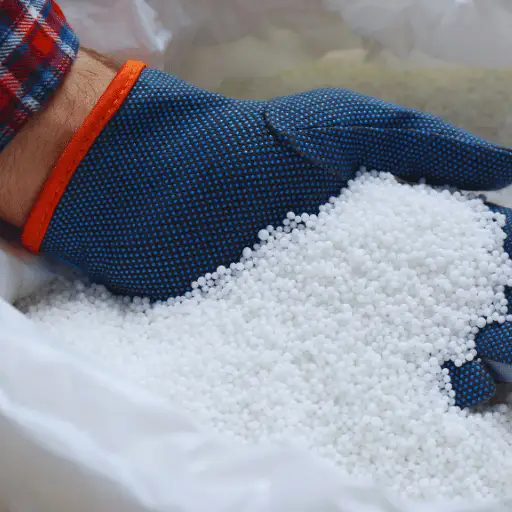In the quest for higher yields and healthier plants, fertilizers play a pivotal role. Among the myriad choices, potassium nitrate stands out for its unique benefits. But what makes it so special? This blog will explore the many advantages of potassium nitrate fertilizer, providing you with valuable insights to enhance your agricultural endeavors. Whether you’re a commercial farmer, horticulturist, or agricultural enthusiast, you’ll find practical tips and essential knowledge to maximize your crop’s potential.
What is Potassium Nitrate and How Does it Benefit Plants?
Potassium nitrate, often referred to as saltpeter, is a chemical compound commonly used as a fertilizer. It consists of two essential nutrients for plant growth—potassium (K) and nitrogen (N). These elements are crucial for various physiological processes within the plant. Potassium helps with water regulation, enzyme activation, and photosynthesis, while nitrogen is vital for protein synthesis and growth.
Using potassium nitrate as a fertilizer ensures that plants receive a balanced supply of these nutrients. This leads to improved plant health, increased resistance to diseases, and better overall growth. Additionally, potassium nitrate is highly soluble in water, making it easy for plants to absorb and utilize.
Understanding Potassium Nitrate as a Fertilizer
Potassium nitrate is unique because it provides both potassium and nitrogen in a single compound. This dual-nutrient approach simplifies fertilization practices, allowing for more efficient nutrient management. Unlike some fertilizers that only supply one nutrient, potassium nitrate addresses multiple needs simultaneously.
The solubility of potassium nitrate also makes it an excellent choice for fertigation, where nutrients are delivered through irrigation systems. This method ensures even distribution of nutrients, reducing waste and increasing efficiency. By understanding how potassium nitrate functions as a fertilizer, you can make informed decisions about its application in your agricultural practices.

How Potassium and Nitrate Work Together in Plant Nutrition
Potassium and nitrate work synergistically to enhance plant nutrition. Potassium plays a key role in water regulation within the plant, helping to maintain turgor pressure and reduce water loss through transpiration. This is especially important during periods of drought or water stress.
Nitrate, on the other hand, is a readily available form of nitrogen that plants can easily absorb. It is essential for the synthesis of amino acids, proteins, and chlorophyll, all of which are critical for plant growth and development. When combined, potassium and nitrate create a balanced nutrient environment that promotes optimal plant health.
By providing both potassium and nitrate in a single application, potassium nitrate fertilizer ensures that plants receive the nutrients they need in the right proportions. This leads to improved growth, higher yields, and better resistance to environmental stresses.
The Role of Potassium Nitrate in Soil Health
Healthy soil is the foundation of successful agriculture, and potassium nitrate plays a significant role in maintaining soil health. One of the key benefits of potassium nitrate is its ability to improve soil structure. Potassium helps to bind soil particles together, creating a stable structure that enhances water retention and aeration.
Additionally, potassium nitrate is less likely to cause soil acidification compared to other nitrogen-based fertilizers. This is important because acidic soils can lead to nutrient imbalances and reduced microbial activity. By using potassium nitrate, you can help maintain a neutral pH level in your soil, promoting better nutrient availability and microbial health.
Furthermore, potassium nitrate is highly soluble, meaning it quickly dissolves in soil water and becomes available to plants. This rapid availability ensures that nutrients are delivered to the plant roots efficiently, reducing the risk of nutrient leaching and runoff.
Why Should You Use Potassium Nitrate for Your Crops?
There are several compelling reasons to choose potassium nitrate for your crops. Firstly, its dual-nutrient composition simplifies fertilization practices, reducing the need for multiple applications and saving time. Secondly, its high solubility ensures rapid nutrient uptake by plants, leading to improved growth and yields.
Potassium nitrate also supports better water management within plants, enhancing their ability to withstand drought and other environmental stresses. This is particularly important for crops grown in regions with variable rainfall.
Additionally, potassium nitrate promotes healthy soil structure and reduces the risk of soil acidification, ensuring long-term soil fertility. By choosing potassium nitrate, you can enjoy the benefits of improved plant health, higher yields, and sustainable agricultural practices.
Advantages of Using Potassium Nitrate Over Other Fertilizers
When compared to other fertilizers, potassium nitrate offers several distinct advantages. Unlike ammonium nitrate, which can acidify the soil, potassium nitrate helps maintain a neutral pH level, promoting better nutrient availability and microbial activity.
Potassium nitrate is also less prone to volatilization and leaching compared to urea-based fertilizers. This means that more of the applied nutrients are retained in the soil, reducing waste and environmental impact.
Furthermore, potassium nitrate’s high solubility makes it an excellent choice for fertigation, ensuring even distribution of nutrients through irrigation systems. This leads to more efficient nutrient uptake and better overall plant health.
Impact of Potassium Deficiency on Crop Yield
Potassium deficiency can have a significant impact on crop yield and quality. Symptoms of potassium deficiency include yellowing of leaves, reduced growth, and poor fruit development. In severe cases, potassium deficiency can lead to plant death.
Potassium-deficient plants are also more susceptible to diseases and environmental stresses, such as drought and frost. This can result in lower yields and reduced crop quality, impacting the overall profitability of your agricultural operations.
By ensuring an adequate supply of potassium through the use of potassium nitrate fertilizer, you can prevent these issues and promote healthy, high-yielding crops.
Improving Potassium Uptake in Plants
To maximize the benefits of potassium nitrate fertilizer, it’s important to optimize potassium uptake in plants. One way to do this is by ensuring that soil pH levels are within the optimal range for potassium availability, typically between 6.0 and 7.0.
Additionally, proper irrigation practices can enhance potassium uptake. Potassium is a mobile nutrient, meaning it moves with water through the soil. By maintaining consistent soil moisture levels, you can ensure that potassium is readily available to plant roots.
Regular soil testing can also help you monitor potassium levels and adjust fertilization practices accordingly. By understanding the specific needs of your soil and crops, you can tailor your potassium nitrate applications for maximum effectiveness.

How to Effectively Apply Potassium Nitrate Fertilizer?
Effective application of potassium nitrate fertilizer involves several key steps. First, it’s important to determine the specific nutrient needs of your crops through soil testing and analysis. This will help you calculate the appropriate application rates for potassium nitrate.
Next, choose the right application method based on your crop type and irrigation system. For example, fertigation is an excellent option for crops grown under irrigation, as it ensures even distribution of nutrients. For dryland crops, broadcasting or side-dressing may be more appropriate.
Finally, consider the timing of your fertilizer applications. Applying potassium nitrate at key growth stages, such as flowering and fruit development, can enhance nutrient uptake and improve crop performance.
Best Practices for Fertilizer Application
To get the most out of your potassium nitrate fertilizer, follow these best practices:
- Regular Soil Testing: Conduct soil tests to determine nutrient levels and pH, allowing you to tailor your fertilization practices.
- Application Timing: Apply potassium nitrate at critical growth stages to maximize nutrient uptake and crop performance.
- Proper Irrigation: Ensure consistent soil moisture levels to enhance potassium mobility and availability to plant roots.
By following these best practices, you can optimize the benefits of potassium nitrate fertilizer and promote healthy, high-yielding crops.
How to Customize Your Fertilizer Application for Different Soils
Different soil types have varying nutrient needs and properties, which can affect the effectiveness of potassium nitrate fertilizer. Sandy soils, for example, have low nutrient-holding capacity and may require more frequent applications of potassium nitrate.
Clay soils, on the other hand, have high nutrient-holding capacity but can become compacted, reducing nutrient availability. In such cases, incorporating organic matter can improve soil structure and enhance nutrient uptake.
By understanding the specific characteristics of your soil, you can customize your potassium nitrate applications to meet the unique needs of your crops and soil conditions.
Timing Your Potassium Nitrate Fertilizer Application
Timing is crucial when it comes to applying potassium nitrate fertilizer. The best time to apply potassium nitrate is during key growth stages when nutrient demand is highest. For most crops, this includes periods of rapid vegetative growth, flowering, and fruit development.
Applying potassium nitrate at these stages ensures that plants have sufficient nutrients to support growth and development. It’s also important to avoid applying potassium nitrate during periods of heavy rainfall, as this can lead to nutrient leaching and reduced effectiveness.
By carefully timing your fertilizer applications, you can maximize nutrient uptake and improve crop performance.

Where Can You Buy Potassium Nitrate Fertilizer?
Potassium nitrate fertilizer is widely available from agricultural supply stores, garden centers, and online retailers. When purchasing potassium nitrate, it’s important to choose a reputable supplier to ensure product quality and reliability.
Look for suppliers that provide detailed product information, including nutrient content and application guidelines. You may also want to consider purchasing in bulk to save on costs and ensure a consistent supply of potassium nitrate for your crops.
Finding Reliable Suppliers for Potassium Nitrate
Finding a reliable supplier for potassium nitrate fertilizer is essential for ensuring product quality and consistency. Start by researching suppliers online and reading customer reviews to gauge their reputation and reliability.
You can also ask for recommendations from other farmers or agricultural professionals in your network. Once you’ve identified potential suppliers, contact them directly to inquire about product specifications, pricing, and delivery options.
Choosing a reliable supplier will give you peace of mind and ensure that you have access to high-quality potassium nitrate fertilizer for your crops.
Cost Factors When Buying Potassium Nitrate
The cost of potassium nitrate fertilizer can vary depending on several factors, including the supplier, product quality, and quantity purchased. Bulk purchases are often more cost-effective, so consider buying larger quantities to save on costs.
Additionally, compare prices from multiple suppliers to find the best deal. Keep in mind that the cheapest option may not always be the best in terms of quality, so balance cost considerations with product reliability.
By carefully evaluating cost factors, you can make informed purchasing decisions and ensure that you get the best value for your investment in potassium nitrate fertilizer.
Choosing Between Different Types of Potassium Fertilizers
There are several types of potassium fertilizers available, each with its own advantages and disadvantages. Potassium nitrate is a popular choice due to its dual-nutrient composition and high solubility. Other options include potassium chloride, potassium sulfate, and potassium-magnesium sulfate.
When choosing between different types of potassium fertilizers, consider factors such as nutrient content, solubility, and application method. Potassium chloride, for example, is highly soluble but can cause soil salinity issues, while potassium sulfate provides sulfur in addition to potassium.
By understanding the pros and cons of each type of potassium fertilizer, you can make informed decisions about which product is best suited to your crops and soil conditions.
What Are the Alternatives to Potassium Nitrate Fertilizer?
While potassium nitrate offers many benefits, there are alternative fertilizers that can also provide potassium to your crops. These include ammonium nitrate, calcium nitrate, and potassium chloride.
Ammonium nitrate is a nitrogen-based fertilizer that also provides some potassium, making it a suitable alternative for crops with high nitrogen and potassium requirements. Calcium nitrate, on the other hand, provides calcium in addition to potassium, which can benefit soil structure and plant health.
Potassium chloride is another common alternative, but it can cause soil salinity issues if used excessively. By exploring these alternatives, you can find the best fertilizer option for your specific needs and conditions.
Comparing Potassium Nitrate with Ammonium Nitrate and Calcium Nitrate
When comparing potassium nitrate with ammonium nitrate and calcium nitrate, there are several key differences to consider. Potassium nitrate provides both potassium and nitrate in a single compound, making it a convenient and efficient option for fertilization.
Ammonium nitrate, while primarily a nitrogen fertilizer, also provides some potassium. However, it can cause soil acidification and may not be suitable for all soil types. Calcium nitrate provides calcium in addition to potassium, which can benefit soil structure and plant health.
Ultimately, the best choice will depend on your specific crop needs, soil conditions, and fertilization practices.
Understanding the Role of Potassium Chloride and Other Potash Sources
Potassium chloride, also known as muriate of potash, is one of the most commonly used potassium fertilizers. It is highly soluble and provides a readily available source of potassium for plants. However, excessive use of potassium chloride can lead to soil salinity issues, which can negatively impact plant growth.
Other potash sources include potassium sulfate, which provides sulfur in addition to potassium, and potassium-magnesium sulfate, which provides magnesium. These alternatives can be beneficial for crops with specific nutrient requirements.
By understanding the role of different potash sources, you can choose the best fertilizer option for your crops and soil conditions.
When to Use Nitrate of Potash Instead of Potassium Nitrate
Nitrate of potash, also known as potassium nitrate, is a versatile fertilizer that can be used in a variety of agricultural applications. It is particularly beneficial for crops that require both potassium and nitrogen, such as fruits, vegetables, and ornamental plants.
In some cases, nitrate of potash may be preferred over potassium nitrate due to its specific nutrient composition and solubility. For example, nitrate of potash is an excellent choice for fertigation, as it dissolves easily in water and provides a balanced supply of nutrients.
By understanding the specific benefits of nitrate of potash, you can make informed decisions about its use in your agricultural practices.

Reference sources
Potassium nitrate
Soil
Potassium
FQA
Q: What are the benefits of using potassium nitrate as a fertilizer?
A: Potassium nitrate is a highly effective fertilizer that provides both potassium and nitrate, essential for plant growth. It enhances nutrient uptake, improves water retention in soil, and promotes flowering and fruiting in plants.
Q: How does potassium nitrate improve potassium uptake in plants?
A: Potassium nitrate is a soluble source of potassium that facilitates easy absorption by plant roots. Its nitrate component also helps in enhancing overall nutrient uptake, leading to healthier plants.
Q: Can I buy potassium nitrate for personal use in my garden?
A: Yes, you can buy potassium nitrate from garden supply stores or online retailers. Ensure to follow application guidelines to personalize your experience and achieve the best results in your garden.
Q: What signs indicate a potassium deficiency in plants?
A: Symptoms of potassium deficiency include yellowing of leaf edges, stunted growth, and poor fruit development. If you notice these signs, consider using potassium nitrate as a fertilizer to remedy the deficiency.
Q: Is potassium nitrate soluble in water?
A: Yes, potassium nitrate is water-soluble, making it easy to apply through irrigation systems or as a foliar spray. This solubility ensures that plants can readily absorb the nutrients.
Q: How does potassium nitrate compare to other potassium fertilizers?
A: Potassium nitrate offers the dual benefits of both potassium and nitrogen, unlike some fertilizers such as potassium chloride or potassium sulfate, which contain only potassium. This makes potassium nitrate a more versatile option for plant nutrition.
Q: What is the recommended method for applying potassium nitrate fertilizer?
A: Potassium nitrate can be applied through soil incorporation or as a liquid fertilizer during irrigation. It’s important to follow manufacturer recommendations for dosage and timing to optimize nutrient uptake.
Q: Can potassium nitrate affect soil pH?
A: Potassium nitrate is neutral in terms of pH and does not significantly affect soil acidity or alkalinity. It can be a good choice for maintaining balanced soil conditions while providing essential nutrients.
Q: What role does potassium play in overall plant health?
A: Potassium is a crucial macronutrient that aids in various plant processes, including water regulation, enzyme activation, and carbohydrate synthesis. Adequate potassium levels help strengthen plants against diseases and environmental stress.
Q: Are there any environmental concerns associated with using potassium nitrate?
A: While potassium nitrate is effective for plant growth, excessive use can lead to nitrate leaching into water sources, causing environmental issues. It’s important to apply potassium nitrate judiciously to minimize any potential negative impact.







